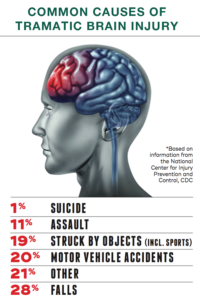Traumatic Brain Injury
Traumatic brain injury (TBI) is a condition resulting from external force or impact on the head.
 Whether caused by accidents, falls, or other traumatic events, TBIs can have profound and varied effects on cognitive, emotional, and physical functions.
Whether caused by accidents, falls, or other traumatic events, TBIs can have profound and varied effects on cognitive, emotional, and physical functions.
Traumatic brain injuries range from mild concussions to severe injuries with long-term consequences.
They occur when the brain’s normal function is disrupted due to a sudden blow, jolt, or penetrating injury to the head.
The severity of a TBI can lead to a spectrum of symptoms, from temporary confusion to prolonged unconsciousness and cognitive impairment.
TBIs can result from various incidents, including falls, sports injuries, car accidents, or violent assaults.
The impact on the head causes the brain to be displaced beyond the cerebral spinal fluid that it sits and crash into the rigid walls of the skull, leading to bruising, bleeding, and damage to neural tissues.
The complexity of TBI lies in the immediate and secondary damage that occurs, with subsequent inflammation and swelling further complicating the recovery process.
What Other Medical Conditions are Linked to Traumatic Brain Injuries?
While traumatic brain injuries are distinct, they can be associated with other medical conditions.
Individuals who experience a traumatic event leading to a TBI may also develop Post Traumatic Stress Disorder, a condition marked by persistent emotional distress and anxiety.
TBIs can increase the risk of developing epilepsy, a neurological disorder characterized by recurrent seizures.
Disruptions to sleep patterns are common after a TBI and can contribute to the development or exacerbation of sleep disorders, all of which can severely impact work and daily life.



